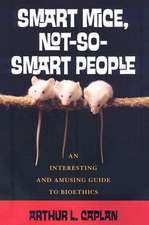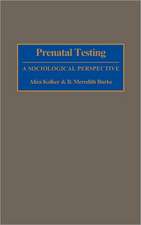The Ethical Challenges of Emerging Medical Technologies
Editat de Arthur L. Caplan, Brendan Parenten Limba Engleză Hardback – 26 oct 2016
Preț: 1636.88 lei
Preț vechi: 2201.25 lei
-26% Nou
Puncte Express: 2455
Preț estimativ în valută:
313.30€ • 325.84$ • 262.54£
313.30€ • 325.84$ • 262.54£
Carte tipărită la comandă
Livrare economică 14-28 martie
Preluare comenzi: 021 569.72.76
Specificații
ISBN-13: 9781472429155
ISBN-10: 147242915X
Pagini: 508
Dimensiuni: 174 x 246 x 40 mm
Greutate: 1 kg
Ediția:1
Editura: Taylor & Francis
Colecția Routledge
Locul publicării:Oxford, United Kingdom
ISBN-10: 147242915X
Pagini: 508
Dimensiuni: 174 x 246 x 40 mm
Greutate: 1 kg
Ediția:1
Editura: Taylor & Francis
Colecția Routledge
Locul publicării:Oxford, United Kingdom
Cuprins
About the Editors -- Acknowledgments -- Series Preface -- Introduction -- Part I: Ethics and Oversight -- 1 F. Lucivero, T. Swierstra and M. Boenink, Assessing Expectations: Towards a Toolbox for an Ethics of Emerging Technologies, Nanoethics, 5:2, 129–41 (2011) -- 2 B. Hofmann, Why Ethics Should Be Part of Health Technology Assessment, International Journal of Technology Assessment in Health Care, 24:4, 423–9 (2008) -- 3 D.B. Kramer, Shuai Xu and Aaron S. Kesselheim, Regulation of Medical Devices in the United States and European Union, New England Journal of Medicine, 366:9, 848–55 (2012) -- 4 G.D. Curfman and R.F. Redberg, Medical Devices: Balancing Regulation and Innovation, New England Journal of Medicine, 365:11, 975–7 (2011) -- 5 Emily C. Feinstein, Arthur Caplan, Jonathan D. Moreno and Ilene Albala- Reicher, The Ethics of Off-Label Use of FDA-Approved Products, in Mark Levy, ed., Off-Label Communications: A Guide to Sales and Marketing Compliance (4th edition). Washington, DC: Food and Drug Law Institute, 2014, pp. 49–77 -- Part II: Preventive -- 6 M.J. Young, D.A. Sisti, H Rimon-Greenspan, J.L. Schwartz and A.L. Caplan, Immune to Addiction: The Ethical Dimensions of Vaccines against Substance Abuse, Nature Immunology, 13:6, 521–4 (2012) -- 7 A.L. Bredenoord, G. Pennings and G. de Wert, Ooplasmic and Nuclear Transfer to Prevent Mitochondrial DNA Disorders: Conceptual and Normative Issues, Human Reproduction Update, 14:6, 669–78 (2008) -- 8 R Sparrow and L Sparrow, In the Hands of Machines? The Future of Aged Care, Minds and Machines, 16:2, 141–61 (2006) -- 9 S.S. Bull, L.T. Breslin, E.E. Wright, S.R. Black, D. Levine and J.S. Santelli, Case Study: An Ethics Case Study of HIV Prevention Research on Facebook: The Just /Us Study, Journal of Pediatric Psychology, 36:10, 1082–92 (2011) -- 10 J. Timmermans, Y. Zhao and J. van den Hoven, Ethics and Nanopharmacy: Value Sensitive Design of New Drugs, Nanoethics, 5:3, 269–83 (2011) -- Part III: Diagnostic -- 11 B.J. Healey, D. Kopen and J Smith, Physicians, Defensive Medicine, and Ethics, Academy of Health Care Management Journal, 7:1, 59–78 (2011) -- 12 Eric T. Juengst, Michael A. Flatt and Richard A. Settersten Jr, Personalized Genomic Medicine and the Rhetoric of Empowerment., Hastings Center Report, 42:5, 34–40 (2012) -- 13 Holly K. Tabor, Jeffrey C. Murray, Hilary S. Gammill, Jacob O. Kitzman, Matthew W. Snyder, Mario Ventura, Alexandra P. Lewis, Ruolan Qiu, LaVone E. Simmons, Craig E. Rubens, Mark K. Santillan, Evan E. Eichler, Edith Y. Cheng, Michael J. Bamshad and Jay Shendure, Non-Invasive Fetal Genome Sequencing: Opportunities and Challenges, American Journal of Medical Genetics. Part A, 158:10, 2382–4 (2012) -- 14 Ralf J. Jox, James L. Bernat, Steven Laureys and Eric Racine, Disorders of Consciousness: Responding to Requests for Novel Diagnostic and Therapeutic Interventions, The Lancet Neurology, 11:8, 732–8 (2012) -- Part IV: Treatment Monitoring and Medical Information -- 15 R. Steinbrook, Personally Controlled Online Health Data: The Next Big Thing in Medical Care?, New England Journal of Medicine, 358:16, 1653–6 (2008) -- 16 Pilar N. Ossorio, The Ethics of Translating High-Throughput Science into Clinical Practice, Hastings Center Report, 44:5, 8–9 (2014) -- 17 E. Palm, Who Cares? Moral Obligations in Formal and Informal Care Provision in the Light of ICT-Based Home Care, Health Care Analysis, 21:2, 171–88 (2013) -- 18 E.-H.W. Kluge, Ethical and Legal Challenges for Health Telematics in a Global World: Telehealth and the Technological Imperative, International Journal of Medical Informatics, 80:2, e1–e5 (2011) -- 19 Sharona Hoffman and Andy Podgurski, Big Bad Data: Law, Public Health, and Biomedical Databases, Journal of Law, Medicine and Ethics, 41:Suppl 1, 56–60 (2013) -- Part V: Therapeutic -- 20 M. Miyasaka, S.Sasaki, M. Tanaka and J. Kikunaga, Use of Brain-Machine Interfaces as Prosthetic Devices: An Ethical Analysis, Journal of Philosophy and Ethics in Health Care and Medicine, 6, 29–38 (2012) -- 21 R. Grant, C. Halpern, G. Baltuch, J. O’Reardon and A. Caplan, Ethical Considerations in Deep Brain Stimulation for Psychiatric Illness, Journal of Clinical Neuroscience, 21:1, 1–5 (2014) -- 22 J. Dixon, J. Logue and P. Komesaroff, Promises and Ethical Pitfalls of Surgical Innovation: The Case of Bariatric Surgery, Obesity Surgery, 23:10, 1698–1702 (2013) -- 23 P. McCormack, S. Woods, A. Aartsma-Rus, L. Hagger, A. Herczegfalvi, E. Heslop, J. Irwin, J. Kirschner, P. Moeschen, F. Muntoni, M. Ouillade, J. Rahbek, C. Rehmann-Sutter, F. Rouault, T. Sejersen, E. Vroom, V. Straub, K. Bushby and A. Ferlini, Guidance in Social and Ethical Issues Related to Clinical, Diagnostic Care and Novel Therapies for Hereditary Neuromuscular Rare Diseases: “Translating” the Translational, PLOS Currents Muscular Dystrophy, 1 (January 2013). doi: 10.1371 /currents.md.f90b49429fa814bd26c5b22b13d773ec -- 24 Jeremy Sugarman, Questions Concerning the Clinical Translation of Cell- Based Interventions under an Innovation Pathway, Journal of Law, Medicine and Ethics, 40:4, 945–50 (2012) -- 25 Fa-Ming Chen, Yi-Min Zhao, Yan Jin and Songtao Shi, Prospects for Translational Regenerative Medicine, Biotechnology Advances, 30:3, 658–72 (2012) -- 26 K.I. Reid and C.S. Greene, Diagnosis and treatment of Temporomandibular Disorders: An Ethical Analysis of Current Practices, Journal of Oral Rehabilitation, 40:7, 546–61 (2013) -- Part VI: Rescue and End of Life -- 27 S. Badylak, D. Weiss, A. Caplan and P. Macchiarini, Engineered Whole Organs and Complex Tissues, The Lancet, 379:9819, 1–10 (2012) -- 28 D. Abrams, K. Prager, C. Blinderman, K. Burkart and D. Brodie, Ethical Dilemmas Encountered with the Use of Extracorporeal Membrane Oxygenation in Adults, Chest, 145:4, 876–82 (2014) -- 29 M. Gysels, N. Evans, A. Meñaca, E. Andrew, F. Toscani, S. Finetti, H. Roeline Pasman, I. Higginson, R. Harding and R. Pool, Culture and End of Life Care: A Scoping Exercise in Seven European Countries, PLoS ONE, 7:4, 1–16 (2012) -- 30 D. Sulmasy. Within You /Without You: Biotechnology, Ontology, and Ethics, Journal of General Internal Medicine, 23:Suppl 1, 69–72 (2007) -- 31 J. Guerra González, Ethical and Regulatory Issues for Clinical Trials in Xenotransplantation, Humana Press, 281–305 (2012) -- 32 K. Swetz and J. Keith Mansel, Ethical Issues and Palliative Care in the Cardiovascular Intensive Care Unit, Cardiology Clinics, 31:4, 657–68 (2013) -- Part VII: Normalization and Enhancement -- 33 Silvia Camporesi and Michael J. McNamee, Gene Transfer for Pain: A Tool To Cope With The Intractable, Or An Unethical Endurance Enhancing Technology?, Life Sciences Society and Policy, 8:1, 20–31 (2012) -- 34 A. Frank, Emily’s Scars: Surgical Shapings, Technoluxe, and Bioethics in Erik Parens, ed., Surgically Shaping Children. Baltimore, MD: Johns Hopkins University Press, pp. 68–89 -- 35 Tom Humphries, Poorna Kushalnagar, Gaurav Mathur, Donna Jo Napoli, Carol Padden, Christian Rathmann and Scott Smith, Cochlear Implants and the Right to Language: Ethical Considerations, the Ideal Situation, and Practical Measures Toward Reaching the Ideal, in Cila Umat and Rinze Anthony Tange, eds, Cochlear Implant Research Updates. Rijeka, Croatia: InTech, 2012, pp. 193–212 -- 36 Ruby Catsanos, Wendy Rogers and Mianna Lotz, The Ethics of Uterus Transplantation, Bioethics, 27:2, 65–73 (2013) -- 37 F. Coeytaux, M. Darnovsky and S.B. Fogel, Assisted Reproduction and Choice in the Biotech Age: Recommendations for a Way Forward, Contraception, 83:1, 1–4 (2011) -- 38 David Gems, Tragedy and Delight: The Ethics of Decelerated Ageing, Philosophical Transactions of the Royal Society B: Biological Sciences, 366:1561, 108–12 (2011) -- 39 Barbro Elisabeth Esmeralda Fröding, Cognitive enhancement, virtue ethics and the good life, Neuroethics, 4:3, 223–34 (2011) -- Index.
Notă biografică
Arthur L. Caplan is the Drs. William F and Virginia Connolly Mitty Professor and head of the Division of Medical Ethics at the NYU Langone Medical Center, USA Brendan Parent is an attorney, and Rudin Postdoctoral Fellow in the Division of Medical Ethics at the NYU Langone Medical Center.
Descriere
This collection of essays emphasizes society's increasingly responsible engagement with ethical challenges in emerging medical technology. They showcase ways in which modern ethical thinking is improving safety, efficacy and efficiency of medical technology, increasing access to medical care, and empowering patients to choose care that comport





















